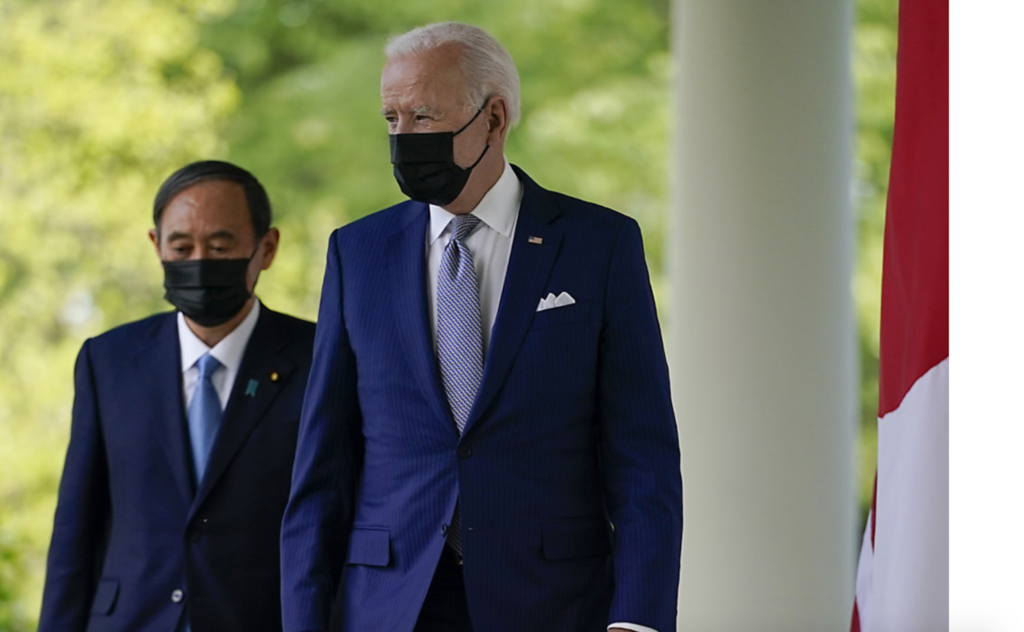Broadening the Scale: Biden Directs Administration Focus to Growing Domestic & Global Issues

Image Courtesy of NY1
By Justin Lamoureux
This week, the nation’s focus remained largely on COVID-19 as vaccinations and variants continuously compete for dominance in the public eye. The Biden Administration was no exception. However, the White House also worked to address other pressing issues on both a domestic and international scale.
President Biden came under fire from many of his fellow Democrats this week for declining to raise the country’s refugee cap. This happened after Biden signed an order maintaining the 15,000 limit on refugee admissions for this year; this controversially low number was set by the Trump Administration. Such a move contradicts Biden’s promise to increase the cap to 62,500 refugees. The president defended this choice, arguing that his administration “couldn’t do two things at once,” invoking the surge in undocumented minors on the southern border, and the toll it has taken on the Office of Refugee Resettlement (ORR). He received scathing criticism from within the Democratic Party, including progressive lawmakers such as Reps. Alexandria Ocasio-Cortez and Ilhan Omar. White House Press Secretary Jen Psaki announced that a new, higher ceiling would be set on May 15, but reiterated that President Biden’s initial goal of 62,500 “seems unlikely” to happen this year.
Shifting his focus to international affairs, Biden was joined at the White House by Japanese Prime Minister Yoshihide Suga for the president’s first in-person diplomatic summit since taking office. Together, the leaders sought to present a united front to countering an increasingly assertive China (with whom both the U.S. and Japan share tense relations). Biden and Suga addressed a number of geopolitical issues during their talks; perhaps most consequential to China’s interests, “the importance of peace and stability of the Taiwan Strait.” Recently, Beijing has increased military pressure on the Chinese-claimed, self-ruled island. It should be noted that the joint leaders’ statement was the first blatant reference to Taiwan since 1969, before Tokyo normalized ties with Beijing. Other concerns regarding China’s recent political activities that were addressed during the summit included its tightening grip on Hong Kong and persecution of Muslim Uighurs in Xinjiang Province. The Chinese embassy in Washington, D.C. strongly condemned the joint statement, arguing that issues addressed were China’s internal affairs.
On Tuesday, the Biden Administration became involved with an ongoing – and oftentimes controversial – political debate, and formally endorsed a long-shot Democratic bid to make Washington, D.C., the 51st state. Citing the need to ensure that 700,000 Washington residents can have full voting representation in both chambers of Congress, the Office of Management and Budget declared that Congress should “provide for a swift and orderly transition to statehood” for the District itself. The House is set to vote on a bill – H.R. 51 , which would put the District of Columbia on “equal footing with the other states.” The legislation is expected to pass in the House, but will most likely face obstacles in the Senate, where 60 votes are required to override the filibuster.
Activists have long advocated for Washington, D.C. to be recognized as a state. In fact, city leaders even put the protest slogan “No Taxation Without Representation” on District license plates. However, the issue has received relatively little national attention until recently.
While the majority of Democratic lawmakers now support the idea, Republicans have continuously repudiated the proposal. In addition to deeming D.C. statehood as part of a “leftist agenda” to “defund the police” and “pack the U.S. Supreme Court,” many GOP lawmakers have accused Democrats of attempting to use their current political majorities to solidify their power by adding reliably Democratic seats to Congress.
Biden’s attention this week largely vacillated between domestic and international political issues. However, each area he focused on reflects a broader area of interest, for his party or the country; the debate over whether more refugees should be granted entry to the U.S., for instance, is a microcosm of bipartisan pressure to resolve the ongoing situation at the southern border. Talks with Japan, meanwhile, represent a mutual concern regarding the increased strength (and influence) that China has come to yield from both a geopolitical and economic standpoint (an area of concern for both countries). The administration’s choice to become involved in the pursuit of D.C. statehood embodies heightened Democratic attempts to ensure seemingly equal voting rights and representation for minority groups (Washington, D.C., is a plurality-Black municipality). All told, these areas represent an increasingly broad agenda for the Biden Administration… and only time will tell whether any of its objectives can be attained.







